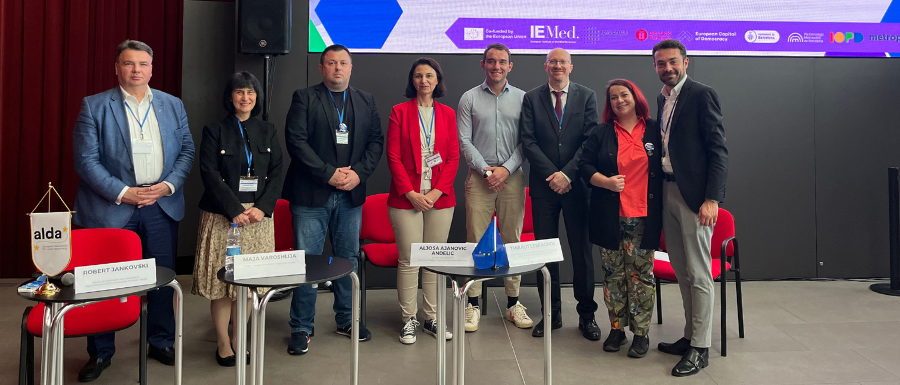The Western Balkans hold a significant place in ALDA’s history, with the first Local Democracy Agency (LDA) established in Subotica, Serbia in 1993. Today, out of the 15 LDAs worldwide, seven continue to operate effectively in the Western Balkans. Over the past 30 years, ALDA has intensified its efforts to support democracy and citizen engagement in the region, bringing the EU closer to the Western Balkans through various initiatives.
During the ALDA Festival and General Assembly – “Local Democracy for Global Impact” held on May 14-15 in Barcelona, Spain, a panel discussion titled “Local Democracy: Effective Strategies for Enhanced Cooperation Between CSOs and Local Authorities in the Western Balkans” was convened. This panel gathered key stakeholders from civil society organisations (CSOs), local authorities, and international bodies to discuss and enhance cooperation for democratic development in the Western Balkans.
Ivana Velkova, Deputy Head of Unit Western Balkans – ALDA Skopje Office, facilitated the panel, providing an overview of the current situation in the region and highlighting the importance of cooperation among stakeholders in promoting stability and democratisation on the path to EU accession.
The session brought together experts from both the European Union and the Western Balkans, offering a unique perspective on cooperation between CSOs and local authorities.
The discussion focused on two main themes: the role of CSOs in fostering transparency and accountability within local governance structures, and successful partnerships between CSOs, government bodies, and international organisations.
Timčo Mucunski, Mayor of Aerodrom, Skopje, emphasised that success at the local level requires institutionalised dialogue between partners, leveraging the strong project implementation capacities of civil society to compensate for the weaker financial capacities of local authorities. He also highlighted the importance of cooperation with the business sector as a driving force for success.
Laurent Plosceanu, Vice-President of the European Economic and Social Committee (EESC), noted that the EESC has actively engaged with candidate countries from the beginning. As a representative institution for CSOs and social partners, the EESC supports civil society both within the EU and in candidate countries, having developed a robust network of CSOs.
Nataša Vučković, newly elected President of ALDA and Secretary General of the Center for Democracy Foundation (CDF) in Serbia, stressed that European integration is not only about economic alignment but also involves a significant social dimension. She pointed out that in some countries, institutions often serve as facades for political decisions, making it crucial to work with local assemblies to defend democracy and prioritise citizens’ interests.
Dženana Dedić, delegate of the Local Democracy Agency Mostar in Bosnia-Herzegovina, presented the results of the “Link 4 Cooperation” project, which involved cooperation among 12 municipalities in B&H, enhancing their capacities while working with local grassroots organisations.
In the second round of discussions, speakers emphasised the importance of successful collaborations among CSOs, government bodies, and international organisations.
Thibaut Lespagnol, Deputy Delegate for Local Communities and Civil Society at the French Ministry for Europe and Foreign Affairs, discussed France’s revised approach to the Balkans since 2017. This strategy underscores France’s commitment to investing in the region, recognising its growth potential. He also noted that while French CSOs have reduced their involvement, the French government has increased financial support to address key challenges and opportunities in the Balkans.
Aljosa Ajanovic Andelic, Member of the Board of Directors of the District 11 City to City Association in Barcelona, highlighted the essential role of city diplomacy in strengthening local policymaking. By engaging in diplomatic relations at the city level, District 11 aims to foster stronger partnerships with other urban centers, facilitating knowledge exchange and collaborative projects.
Maja Varoshlija, project manager at ALDA, presented the new three-year BOOST program, funded by the Agence Française de Développement (AFD). This program aims to optimise opportunities, sustainability, and transformation of civil society in the Western Balkans.
Robert Jankulovski from the Municipality of Karposh in Skopje highlighted the long-standing cooperation with other cities and municipalities, emphasising mutual development and support through partnerships. In 2012, Karposh twinned with Fleury as part of the Normandy-Macedonia ALDA program, fostering a valuable friendship and collaboration, and inspiring similar local projects.
The panel underscored the critical role of CSOs in enhancing accountability, transparency, and civic engagement, essential for the democratic development and EU integration of the Western Balkans. This event was a key part of ongoing efforts to support democratic governance in the region, attended by a wide range of stakeholders committed to fostering positive change.
